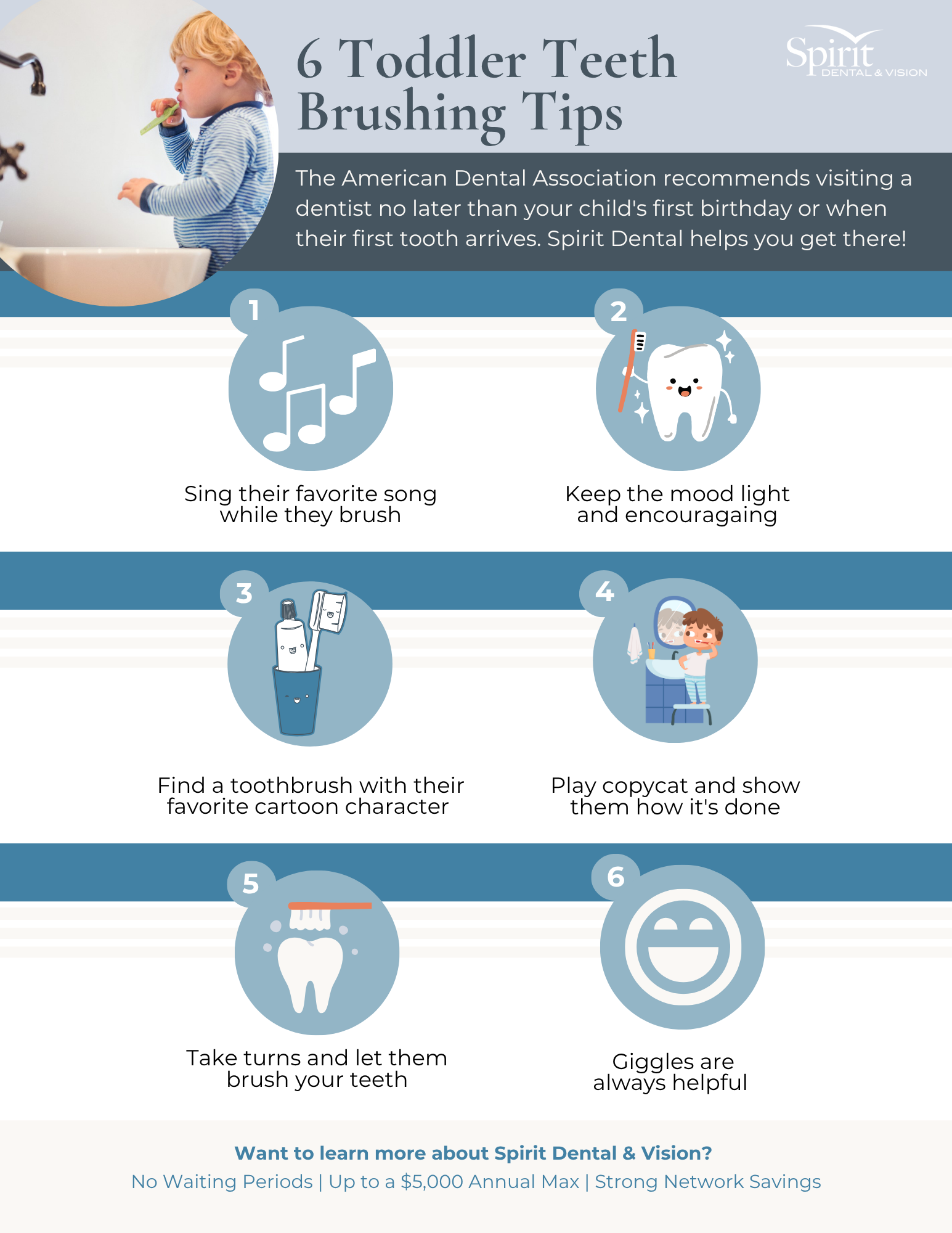New Parent's Guide to Toddler Oral Care

Updated Oct 2025
First-time parents are often focused on caring for their baby’s first teeth, but what about when that baby becomes a busy, opinionated toddler? Toddler oral care is just as important as baby oral care.
This is when lifelong habits begin to form, and a few simple daily routines can make a big difference in your child’s oral health for years to come.
Teething: What to expect
Around six months old, your baby’s first teeth begin to poke through. By age three, most toddlers have a full set of 20 primary teeth. That adorable smile comes with a few challenges: sore gums, drooling, irritability and the occasional sleepless night.
To ease discomfort:
- Offer a chilled (not frozen) teething ring.
- Gently massage your child’s gums with a clean finger.
- If needed, ask your pediatrician about teething gels or remedies.
Once those teeth appear, cleaning them becomes essential, even if they’ll eventually fall out. Healthy baby teeth help your child chew, speak, and smile confidently.
1. Set the foundation for brushing twice daily
Tooth decay can begin as soon as the first tooth erupts, so start brushing right away.
Use a child-sized, soft-bristled toothbrush and just a grain-of-rice-sized dab of fluoride toothpaste. Once your child turns three, you can increase to a pea-sized amount. Brush together every morning and night. Toddlers love imitation. Seeing you brush encourages them to join in.
*See our Tiny Teeth, Big Habits guide below for a few playful tips to make brushing your toddler easier and even a little fun.
2. Flossing is always a great idea
Once two teeth touch, it’s time to floss! Start with floss picks or child-friendly tools to make it easier. You can help at first and then supervise as your toddler learns. Turning flossing into part of the nightly “tooth adventure” helps it stick.
3. Kick the thumb-sucking habit early
Your toddler might continue finding comfort in sucking his or her thumb or a pacifier, but this isn’t a habit that you should condone. Sucking could lead to problems that impact the jaw and the mouth, and it could even ruin the position of your toddler’s teeth, resulting in the need for braces. Therefore, the sooner you teach your toddler that thumb sucking is a big no-no, the better.
How can you gently teach your child that thumb sucking, despite being comforting, isn’t such a good idea? Well, experts recommend using positive reinforcement by praising your toddler when he or she isn’t sucking on a pacifier or a finger.
You could also try applying a yucky tasting remedy to your child’s finger (your pediatrician could direct you towards the right product for your toddler). And it’s also a good idea to figure out what’s causing your child’s anxiety so that you can target the problem and eliminate the thumb sucking behavior.
4. Make seeing the dentist a positive experience
Your toddler’s first dental visit should happen by their first birthday or within six months of their first tooth erupting.
Keep it upbeat:
- Read storybooks about visiting the dentist.
- Schedule a morning appointment when your child is well-rested.
- Reward them afterward with a special activity or sticker.
The dentist will check tooth development and answer your questions about brushing, fluoride, or pacifier use, helping you feel confident in your child’s care routine.
A few extra tips
Here are a few extra tips that you can keep in mind to keep your toddler’s mouth clean and healthy:
- Baby bottle decay is a term used for the tooth decay that occurs when a toddler is allowed to take a nap while holding a bottle of milk, formula, or juice in his or her mouth. These sugary beverages will feed bacteria and spur the development of decay. Yikes! So, if your child really wants a bottle before bed, fill it with water instead.
- A sippy cup is a convenient tool that you can use to always have a beverage handy for your toddler when you’re out and about, as well as when you’re at home. Unfortunately, letting your child drink from a sippy cup throughout the day could also contribute to tooth decay, particularly if you’re filling the cup with a sugary beverage.
- Speaking of sugary drinks, toddlers often like to drink juice, but too much of it could lead to tooth decay. Simply limiting your toddler’s intake to 4 ounces or less per day is a good first step, and making sure you only serve 100% fruit juice is another smart move.
Healthy habits start young
Taking care of toddler teeth isn’t as hard as it seems. With playful routines, positive reinforcement—and a good dental plan—you can help your child grow up with strong, healthy teeth, and a love for brushing.
At Spirit Dental, we believe preventive care is the foundation for a lifetime of smiles. Our dental plans cover cleanings, exams and preventive visits right away with no waiting periods.
Because building good habits early doesn’t just protect your child’s teeth today, it shapes a confident, healthy smile for tomorrow.

